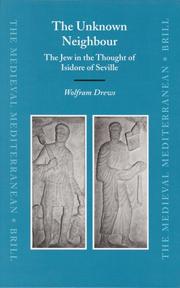| Listing 1 - 3 of 3 |
Sort by
|
Book
ISBN: 9789004250437 9004250433 9789004250444 9004250441 1299847544 9781299847545 Year: 2013 Volume: 60 Publisher: Leiden
Abstract | Keywords | Export | Availability | Bookmark
 Loading...
Loading...Choose an application
- Reference Manager
- EndNote
- RefWorks (Direct export to RefWorks)
In Jews in Medieval Christendom: Slay Them Not , an international group of scholars from numerous disciplines examines the manifold ways that medieval Christians coped with the presence of Jews in their midst. The collection’s touchstone comes from St. Augustine’s interpretation of Psalm 59:11: “Slay them not, lest my people forget: scatter them by thy power; and bring them down,” as it applied to Jews in Christendom, an interpretation that deeply affected medieval Christian strategies for dealing with Jews in Europe. This collection analyzes how medieval writers and artists, often explicitly invoking Augustine, employed his teachings on these strangers within Christian Europe.
Judaism --- Christianity and other religions --- Christianity and antisemitism --- Jews --- Judaism (Christian theology) --- Judaïsme --- Christianisme --- Christianisme et antisémitisme --- Juifs --- Judaïsme (Théologie chrétienne) --- Relations --- Christianity. --- Judaism. --- History. --- History --- History of doctrines --- Histoire --- Histoire des doctrines --- Europe --- Church history --- Histoire religieuse --- Christianity and antisemitism -- History. --- Christianity and other religions -- Judaism. --- Europe -- Church history -- 600-1500. --- Jews -- History -- 70-1789. --- Judaism -- Relations -- Christianity. --- Judaism (Christian theology) -- History of doctrines -- Middle Ages, 600-1500. --- Religion --- Philosophy & Religion --- Christianity --- 296 "04/14" --- Brotherhood Week --- Judaïsme. Jodendom--Middeleeuwen --- Judaïsme --- Christianisme et antisémitisme --- Judaïsme (Théologie chrétienne) --- Religions --- Semites --- Relations&delete&

ISSN: 09285520 ISBN: 9789004149649 9004149643 9047408926 143561478X 9781435614789 9789047408925 Year: 2006 Volume: 59 Publisher: Leiden Boston Brill
Abstract | Keywords | Export | Availability | Bookmark
 Loading...
Loading...Choose an application
- Reference Manager
- EndNote
- RefWorks (Direct export to RefWorks)
This book provides a detailed analysis of Isidore of Seville's attitude towards Jews and Judaism. Starting out from his anti-Jewish work De fide catholica contra Iudaeos , the author puts Isidore's argument into the context of his entire literary production. Furthermore, he explores the place of Isidore's thinking within the contemporary situation of Visigothic Spain, investigating the political functionalization of religion, most particularly the forced baptisms ordered by King Sisebut, whose advisor Isidore was thought to have been. It becomes clear that Isidore's primary goal is to produce a new "Gothic" identity for the recently established Catholic "nation" of Visigothic Spain; to this end he uses anti-Jewish stereotypes inherited from the tradition of Catholic anti-Judaism.
Apologetics --- Christianity and other religions --- Judaism --- Judaism (Christian theology). --- Apologétique --- Christianisme --- Judaïsme --- Judaïsme (Théologie chrétienne) --- History --- Judaism. --- Relations --- Christianity. --- Histoire --- Isidore, --- Christianity --- 276 =71 ISIDORUS HISPALENSIS --- 296*811 --- 261.1 --- 261.1 De Kerk en het Jodendom --- De Kerk en het Jodendom --- 296*811 Antisemitisme--in oudheid en middeleeuwen --- Antisemitisme--in oudheid en middeleeuwen --- Latijnse patrologie--ISIDORUS HISPALENSIS --- Apologétique --- Judaïsme --- Judaïsme (Théologie chrétienne) --- Jews --- Religions --- Semites --- Relations&delete& --- Religion --- Isidorus Hispalensis. --- Brotherhood Week --- Isidorus Hispalensis --- Isidore --- Isidoro, --- Isidor, --- Isidorus, --- Seville, Isidore of, --- Sevilla, Isidoro de --- De Sevilla, Isidoro, --- Sevilla, Isidor von, --- Von Sevilla, Isidor, --- Izydor, --- Christianity and other religions - Judaism --- Judaism - Relations - Christianity --- Isidore, - of Seville, Saint, - d. 636. - De fide Catholica contra Iudaeos --- Judaism (Christian theology)
Book
ISBN: 9789004168510 9004168516 9786612399404 1282399403 9047442911 Year: 2009 Volume: 20 Publisher: Leiden Brill
Abstract | Keywords | Export | Availability | Bookmark
 Loading...
Loading...Choose an application
- Reference Manager
- EndNote
- RefWorks (Direct export to RefWorks)
As Adolf Hitler strategised his way to power, he knew that it was necessary to gain the support of theology and the Church. This study begins two hundred years earlier, however, looking at roots of theological anti-Semitism and how Jews and Judaism were constructed, positively and negatively, in the biblical interpretation of German Protestant theology. Following the two main streams of German theology, the salvation-historical and the Enlightenment-oriented traditions, it examines leading exegetes from the 1750s to the 1950s and explores how theology legitimises or delegitimises oppression of Jews, in part through still-prevailing paradigms. This is the first comprehensive analysis of its kind, and the result of the analysis of the interplay between biblical exegesis and attitudes to Jews and Judaism is a fascinating and often frightening portrait of theology as a servant of power. This book is also available in paperback.
Judaism (Christian theology) --- Christianity and antisemitism --- Christianity and other religions --- Judaism --- Theology, Doctrinal --- Antisemitism --- Judaïsme (Théologie chrétienne) --- Christianisme et antisémitisme --- Christianisme --- Judaïsme --- Théologie dogmatique --- Antisémitisme --- History of doctrines --- History. --- Relations --- Christianity --- Histoire des doctrines --- Histoire --- Bible --- Criticism, interpretation, etc. --- -Christianity and antisemitism --- -Bible --- -Judaism --- -Theology, Doctrinal --- -Antisemitism --- -296*813 --- Antisemitism and Christianity --- Anti-Jewish attitudes --- Anti-Semitism --- Ethnic relations --- Prejudices --- Philosemitism --- Christian doctrines --- Doctrinal theology --- Doctrines, Christian --- Dogmatic theology --- Fundamental theology --- Systematic theology --- Theology, Dogmatic --- Theology, Systematic --- Theology --- Jews --- Religions --- Semites --- Syncretism (Christianity) --- History of doctrines. --- -History. --- -Christianity --- -History --- History --- Christelijk antisemitisme --- Doctrines --- Religion --- 296*813 Christelijk antisemitisme --- Judaïsme (Théologie chrétienne) --- Christianisme et antisémitisme --- Judaïsme --- Théologie dogmatique --- Antisémitisme --- 296*813 --- Judaism&delete& --- Relations&delete& --- Christianity&delete& --- Biblia --- Christianity and other religions.
| Listing 1 - 3 of 3 |
Sort by
|

 Search
Search Feedback
Feedback About UniCat
About UniCat  Help
Help News
News